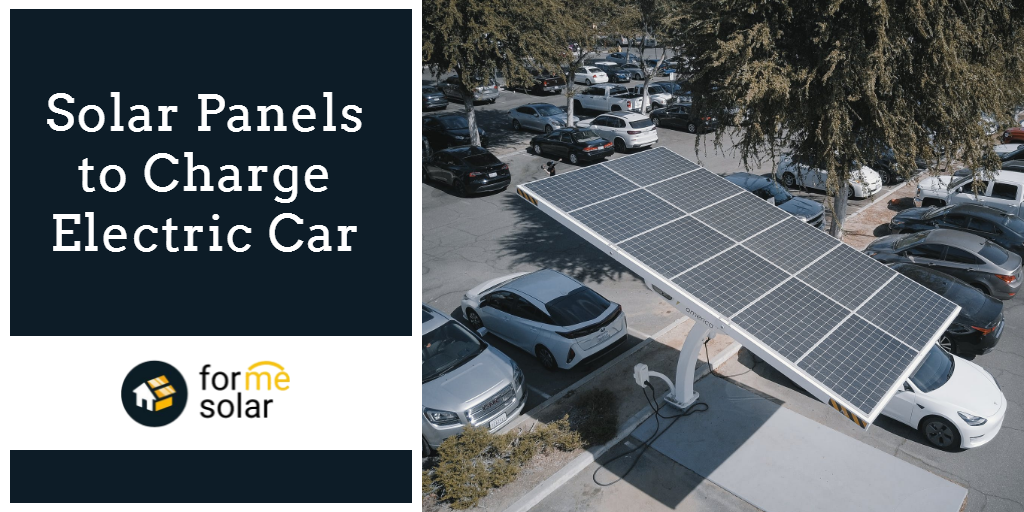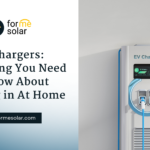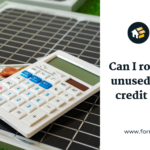
Table of Contents
Solar Panels to Charge Electric Car
If you own an electric vehicle (EV) or want to get one, there's a strong chance you'll consider putting an EV charging station in your house. Home charging connectors allow EV owners to charge their vehicles without having to search for a public charging station.
Because there aren't as many public EV charging stations as there are public petrol stations, owners must necessarily install their own.
The energy used by at-home charging stations is drawn from the existing electrical grid. The cost of utilizing this power is the same as the cost of using ordinary home electricity, and given that an electric car can store a substantial quantity of energy, it may be fairly expensive.
This is why combining a charging station with a solar panel system is an excellent choice for both EV and solar panel owners.
To calculate the number of solar panels required to power your electric vehicle, consider numerous aspects such as the size of your EV battery, the efficiency of your panels, the type of hardware, and so on.
Solar Panels and an Electric Vehicle Charging System
The combination of a solar panel system and an EV charging station offers various advantages and is a cost-effective method of producing and consuming solar energy. You will need this sort of arrangement if you want to put up a solar panel system that can deliver enough energy to charge your electric automobile.
Solar inverters are an essential component of this puzzle. Most of your equipment and appliances require conversion from direct current (DC) to alternating current (AC) before they can utilize the solar energy you generated (AC). This is also true when using solar energy to power your electric automobile.
Finally, the charging port will be placed and linked to the inverter so that it may draw power and transfer it to the electric car's battery.
An even better alternative is to utilize a product like an EV charging inverter, which combines the charger and the inverter into one unit.
How Big Is the Battery in Your EV?
Now that we know how to utilize a solar panel system to power your electric car, we could go into the specifics of how much electricity is needed.
To begin with, the amount of power required to charge your electric vehicle is determined by the capacity of its battery. The battery capacity of an electric vehicle (EV) is measured in kilowatt-hours (kWh), and it can range from the low 20s to 100 kWh or more.
The improved Tesla Model S, for example, has a battery capacity of 100 kWh, but the BMW i3 has just a 33 kWh battery.
How Many Solar Panels Will You Need?
As previously stated, the number of panels required will be determined by the size of your electric car's battery. However, in this scenario, let's use the basic Tesla Model S with a 75 kWh battery.
First, we must examine the quantity of energy produced by a single solar panel. A solar panel's energy production is determined by its material, size, efficiency, and a few other parameters.
Each month, a typical 250-watt solar panel produces 30-42.5 kWh of alternating power. To be safe, let's go with the bare minimum to generate a rough estimate.
If a low-cost solar panel can generate roughly 1 kWh of AC electricity each day, you'd need an amazing 75 solar panels to charge your Tesla Model S to 100 percent capacity from 0 percent each day.
Fortunately, the typical driver drives 37 miles per day, which amounts to around 12 kWh of power. So, 12 solar panels would be a more reasonable quantity. Keep in mind that this is a conservative estimate, so if your solar panels are highly efficient, the number of panels may be reduced even more. Furthermore, if you travel less than 30 miles each day, the number of necessary panels will be significantly reduced.
This figure is quite feasible for potential solar panel owners and EV owners because most solar panel systems have between 25 and 30 solar panels.
Why Should You Use Solar Panels to Power Your Electric Vehicle?
There are several benefits to combining solar panels with your electric vehicle. The biggest reason, maybe, is that it is just less expensive. Solar panels are less expensive in the long run than buying power from the grid in almost every state in the United States. In certain circumstances, creating your own solar energy costs more than half as much as purchasing grid power.
You can install enough solar panels to fulfill your home's energy demands and charge your automobile while saving thousands of dollars in the long run. Furthermore, solar panels are warranted to generate power for at least 25 years, so you'll be saving for a long time.
Another significant advantage of solar energy is the reduction in waste. Switching to an EV immediately reduces emissions since it eliminates the need for gasoline and oil, but energy from the grid is still mostly derived from natural gas and coal.
Just a few solar panels on your roof will produce enough energy to charge your first EV, as well as your second, third, and so on. Again, those panels will endure at least 25 years. It's no surprise that it was called, renewable energy.
Is it necessary to have home solar batteries to store energy for electric vehicle charging?
Many individuals are concerned that they are required to have a battery like the Tesla Powerwall to harness solar energy that will later be used to charge their EV. We're here to inform you that it's not required, and it may even be impractical.
Consider the Tesla Model 3: depending on the variant, it will have a battery capacity ranging from 54 to 82 kWh. To store enough energy to charge a car's battery using stored solar energy, you'd need between 4 and 6 Powerwalls.
Those Powerwalls would set you back at least $30,000, not including the cost of solar panels and a car.
Fortunately, dropping 30 Gs on slimline household batteries isn't required. For starters, you won't commonly need to charge the entire battery at once. Second, you'll probably obtain net metering advantages, which means you'll get credit for any additional solar energy you provide to the grid during the day, which you can use to charge your car at night. The grid serves as your "battery" under net metering.
As an extra benefit, net metering and TOU invoicing may be combined to make solar car charging a very affordable option. When your solar panels generate power during the day, you earn net metering credits at higher daytime rates and may later charge your automobile at lower overnight rates. It's like having the best of both worlds!
The bottom line
When deciding whether or not to install a solar panel system, it is critical to consider whether or not to include a home charging port.
Even if you want to buy an electric car in two or three years, you should design your solar project with that in mind since it will affect the type of inverter and the number of panels you will require.
Solar panels are a cost-effective solution to power an electric vehicle, and you may need anywhere from 6 to 12 panels. The amount of energy you'll require is determined by the capacity of your car's battery and the average number of miles driven per day; you can use the averages as a guideline when conducting your own analysis, but no matter how much electricity you require, charging that car with home solar panels will likely save you a lot of money. And if you ever need assistance, please do not hesitate to contact one of our energy advisers immediately!













